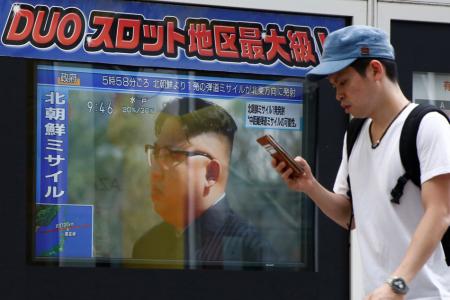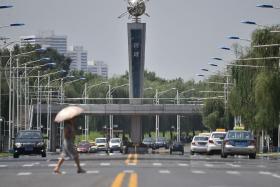North Korea fires missile over Japan, escalating tensions
North Korea fired a missile that flew over Japan and landed in waters off the northern region of Hokkaido early on Tuesday (Aug 29), South Korean and Japanese officials said.
This marks a sharp escalation of tensions on the Korean peninsula.
The UN Security Council will meet later today after a request from the United States, Japan and South Korea to discuss this missile launch.
The test, which experts said appeared to have been a recently developed intermediate-range Hwasong-12 missile, came as U.S. and South Korean forces conduct annual military drills on the peninsula, against which North Korea strenuously objects.
Earlier this month, North Korea threatened to fire missiles into the sea near the U.S. Pacific territory of Guam after U.S. President Donald Trump warned Pyongyang would face “fire and fury” if it threatened the United States.

North Korea has conducted dozens of ballistic missile tests under young leader Kim Jong-Un, the most recent on Saturday, but firing projectiles over mainland Japan is rare. “ North Korea’s reckless action is an unprecedented, serious and a grave threat to our nation,” Japanese Prime Minister Shinzo Abe told reporters.
Abe said Japan was seeking an urgent meeting at the United Nations to strengthen measures against Pyongyang. The test was a clear violation of UN resolutions and the government had protested against the move in the strongest terms, he said.
South Korea also condemned the launch. “We will respond strongly based on our steadfast alliance with the United States if North Korea continues nuclear and missile provocations,” the South’s foreign ministry said in a statement.
North Korea fired what it said was a rocket carrying a communications satellite into orbit over Japan in 2009. The United States, Japan and South Korea considered that launch to have been a ballistic missile test.
“It’s pretty unusual,” said Jeffrey Lewis, head of the East Asia Nonproliferation Program at the Middlebury Institute of Strategic Studies at Monterey, California.
“ North Korea’s early space launches in 1998 and 2009 went over Japan, but that’s not the same thing as firing a missile.”
Japan’s Chief Cabinet Secretary Yoshihide Suga said the latest North Korean missile fell into the sea 1,180 km (735 miles) east of the Cape of Erimo on Hokkaido.
LOUDSPEAKER WARNINGS
The Japanese government’s J-Alert system broke into radio and TV programming, warning citizens of the possible missile.
Bullet train services were temporarily halted and warnings went out over loudspeakers in towns in Hokkaido.
Global markets reacted to the escalation in tensions, buying safe-haven assets such as gold, the Swiss franc and the Japanese yen, and selling stocks.
Japan’s Nikkei 225 index fell almost 1 percent to a near four-month low, while South Korea’s KOSPI index was down a similar percentage.
South Korea’s finance ministry said it will monitor financial markets around the clock and will stabilise markets if needed in the wake of the latest missile test.
South Korea’s military said the missile was launched from the Sunan region near the North Korean capital just before 6am (6.30am Singapore time) and flew 2,700 km, reaching an altitude of about 550 km.
US Secretary of State Rex Tillerson appeared to make a peace overture to North Korea last week, welcoming what he called the restraint Pyongyang had shown recently in its weapons programmes by not conducting any tests since July.
Masao Okonogi, professor emeritus at Japan’s Keio University, said: “( North Korea) think that by exhibiting their capability, the path to dialogue will open,” Okonogi said by phone from Seoul.
“That logic, however, is not understood by the rest of the world, so it’s not easy,” he said.
The Japanese military did not attempt to shoot down the missile, which passed over Japanese territory around 6:07 a.m. local time. It broke into three pieces and fell into waters off Hokkaido, Japanese public broadcaster NHK reported
In Washington, the Pentagon confirmed the missile flew over Japan but said it did not pose a threat to North America and said it was gathering further information.
The United States and South Korea are technically still at war with the North because their 1950-53 conflict ended in a truce, not a peace treaty. The North routinely says it will never give up its weapons programmes, saying they are necessary to counter perceived U.S. hostility.
North Korea had again asked the U.N. Security Council to meet to discuss the ongoing joint U.S.-South Korean military drills, according to a letter released on Monday by the North Korean mission to the United Nations.
The letter from North Korean U.N. Ambassador Ja Song Nam described the military exercises as a “grave threat” to the Korean peninsula and international peace and security.
“It is the fair and square self-defensive right of the DPRK to cope with reckless, aggressive war manoeuvres and the U.S. would be wholly responsible for any catastrophic consequences to be entailed from the result,” Ja wrote, using the initials of North Korea’s official name, the Democratic People’s Republic of Korea.
Similar previous requests have gone unanswered by the 15-member Security Council.
Earlier this month, the Security Council unanimously imposed new sanctions on North Korea in response to two long-range missile launches in July.
- REUTERS
Get The New Paper on your phone with the free TNP app. Download from the Apple App Store or Google Play Store now


